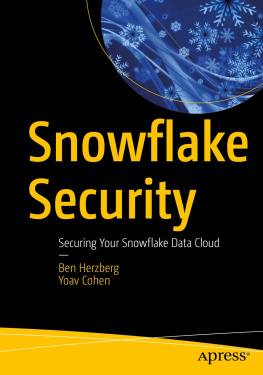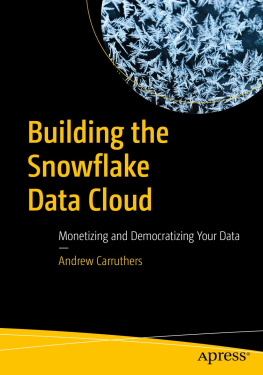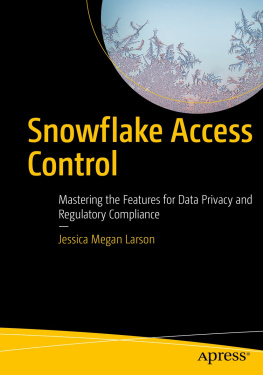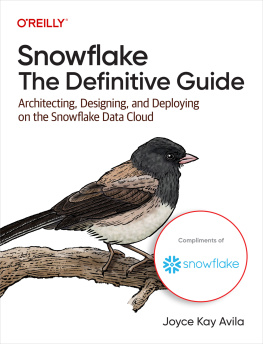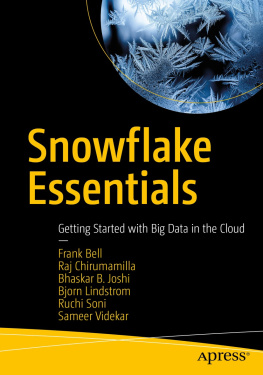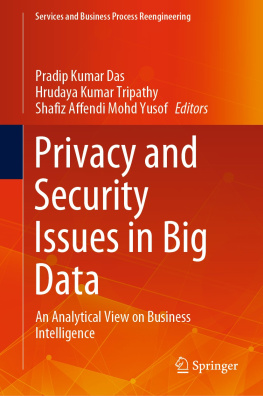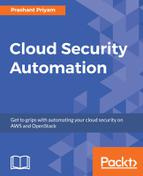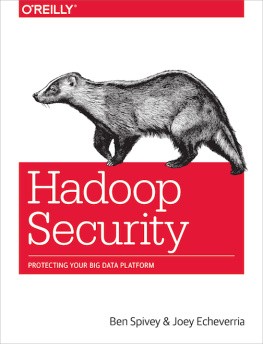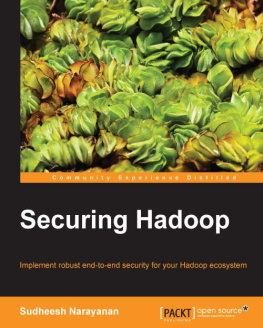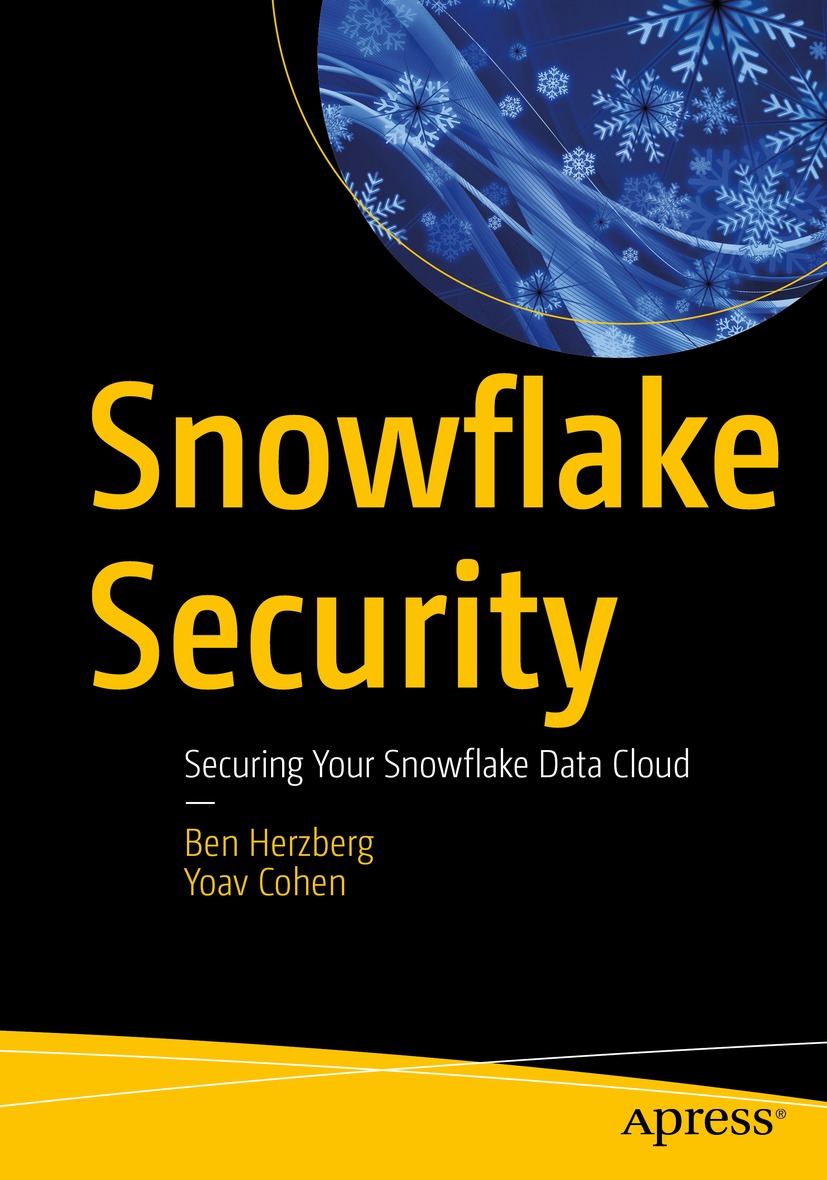Ben Herzberg and Yoav Cohen
Snowflake Security
Securing Your Snowflake Data Cloud
1st ed.

Logo of the publisher
Ben Herzberg
Modiin, Israel
Yoav Cohen
Ness-Ziona, Israel
ISBN 978-1-4842-7388-3 e-ISBN 978-1-4842-7389-0
https://doi.org/10.1007/978-1-4842-7389-0
Ben Herzberg, Yoav Cohen 2022
This work is subject to copyright. All rights are solely and exclusively licensed by the Publisher, whether the whole or part of the material is concerned, specifically the rights of translation, reprinting, reuse of illustrations, recitation, broadcasting, reproduction on microfilms or in any other physical way, and transmission or information storage and retrieval, electronic adaptation, computer software, or by similar or dissimilar methodology now known or hereafter developed.
The use of general descriptive names, registered names, trademarks, service marks, etc. in this publication does not imply, even in the absence of a specific statement, that such names are exempt from the relevant protective laws and regulations and therefore free for general use.
The publisher, the authors and the editors are safe to assume that the advice and information in this book are believed to be true and accurate at the date of publication. Neither the publisher nor the authors or the editors give a warranty, expressed or implied, with respect to the material contained herein or for any errors or omissions that may have been made. The publisher remains neutral with regard to jurisdictional claims in published maps and institutional affiliations.
This Apress imprint is published by the registered company APress Media, LLC part of Springer Nature.
The registered company address is: 1 New York Plaza, New York, NY 10004, U.S.A.
This book is dedicated to my beloved family. Thanks for supporting me throughout this Tal, Yoray, Shira, and Ori. Id also like to thank my parents and siblings for always sticking up for me.
Ben Green Dragon Herzberg
This book is dedicated to Maya, Emma, Ethan, Eviatar, and Eliana, my co-founders in life.
Yoav Cohen
Foreword
Once upon a time, businesses waited to worry about the security of their data stack until their employees, customers, or board told them about a problem. In todays world, the responsible business or technology leader needs to be proactive. Decisions about securing data are foundational and impact everything from how employees or vendors are onboarded to the way reports are distributed, new systems are deployed, and workflows are designed. Why? Because today all businesses run on data.
I have been working to launch software businesses in the tech and media industries since the 1990s. It is rare to find enterprise software that makes teams want to use it more as the business grows, gets more complex, and operations scale. Here is the secret sauce. Sales and support teams are the first to see and hear what customers need to be successful. The game changer is when those needs are communicated to the tech team. Any cloud data platform provider can help their customer learn to use their product in the way the provider intended. Few can build for what their unique customer needs and then deliver that capability at scale. Ultimately, its the engineering leadership that must deliver on the promise to meet customers needs. That willingness to partner on building and delivering is rare.
I first heard about Snowflake in 2016. Several of my peers who were leading large data teams at other companies had started to comment on the performance they were getting with their queries. I had just moved to Seattle to build out a new data team. At the time, I was consumed with hiring, finding data sources, doing the basic reporting, creating a data model, and keeping pace with newly launched online retail businesses hungry for data. I like to be the early adopter. But it felt like too much of a lift to bring in a new data platform.
Then it was 2018, and this was a perfect opportunity. I was grappling with how to integrate a fragmented legacy data infrastructure and a tech org with the dual performance dilemma of frequent systems performance problems and fewer resources than required to supply stakeholders with data. By the end of that first proof of concept, we saw the promise that Snowflake could address all three issues. So, the crucial next step was ensuring whether we could meet our high hurdle for data security. Performance at scale is the entry point for B2B technology providers with any global enterprise, but trust and security are the true differentiators. I believe that Snowflake has both.
Now in 2021, I read or hear about companies and organizations using or misusing data in some new way. Staying fluent in how information moves through an organization and its IT systems is typically not easy. In most organizations, people mainly care only about the information and tools they rely on to get their work done. Nearly every organization has some amount of shadow IT in marketing, finance, customer service, operations, etc., based on individual preferences and the aspiration to move quickly and break things or be a disruptor. But what happens when the systems in the shadows that once met a burning need are orphaned? I think its an interesting question to ask, and while I dont necessarily have a point of view on the solution, I know at least a part of the resulting scenario is a risk.
Fragmentation in the fabric of enterprise technology creates risk with an increased likelihood of error, corruption, misuse, or theft. When you start to look at how much data organizations have started accumulating directly or through third parties, the implications of poor data security become staggering.
Yoav and Ben are helping a lot of organizations with these challenges every day across all sorts of technologies, and now they seek to educate people on Snowflake. Theyve been working on these issues as operators for a long time. Satori was created to build the tools and integration capabilities they wish theyd had so that tech leaders can be better informed about the data security risks in their organizations and make better-informed decisions on how to resolve them.
This guide is written from the perspective of people who understand youre trying to manage risk in an entire organization, not just one tool or platform. They understand the decisions, policies, and other factors that go into making the modern enterprise security strategy successful. They also understand not everyone who may need to become an expert starts out that way.
Overall, the more businesses and tech leaders care about and want to understand data security to protect their employees and customers, the better off we will be for it going forward.
Anita Lynch
VP, Data Governance, Disney Streaming
Introduction
We have been fighting cyber attacks and helping organizations defend themselves from cyber attacks for most of our careers. With cybercriminals, hacktivists, state-sponsored attackers, and insider threats, organizations are at risk of having their data stolen, leaked, or misused. But it doesnt take a sophisticated hacker to put your organization at risk breach of compliance or not meeting contractual obligations can create damage as well.

